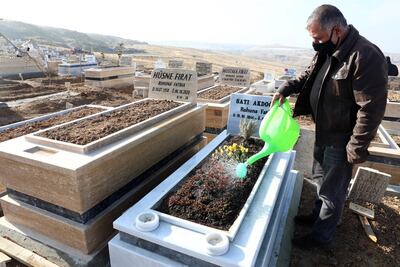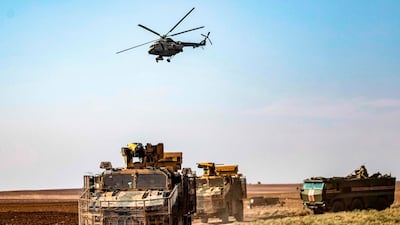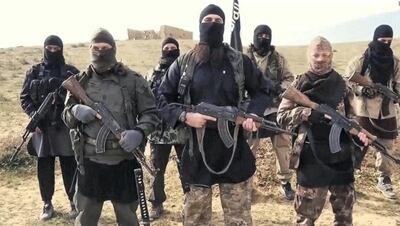The failure of the Turkish authorities to prevent ISIS from acquiring a stockpile of sophisticated weapons during the Syrian conflict raises fresh questions about Ankara’s relationship with Islamist extremists.
According to this week’s report by the Conflict Armament Research Group (Car), ISIS was able to build a major arsenal of explosives, weapons and drones through a sophisticated procurement process that passed through Turkey.
Despite repeated warnings about the arms shipments taking place across the Turkish border, ISIS was able to acquire its own weapons production programme in Iraq and Syria from 2015-2019 through its links with individuals and companies based in southern Turkey, as well as other European countries such as Britain.
The report says that the ISIS weapons programme dealt with more than 50 companies, in more than 20 countries, that produced or distributed goods that ISIS subsequently used to make roadside bombs, drones and improvised weapon systems.
Materials were obtained from countries including the UK, Denmark and Spain, as well as Syria and Turkey.
One of the report’s more eye-catching claims is that ISIS acquired weapons technology such as parts for a jet-powered drone, similar to the V-1 “flying bombs” dropped on London during the Second World War.
The report revealed that from 2015 onwards, ISIS technicians "also sought to develop larger, faster unmanned aerial vehicles (UAVs) powered by pulse jet engines".
A "fully constructed pulse jet engine" was found at a hospital formerly occupied by the terror group in west Mosul, Iraq, in September 2017.
"Pulse jets are a type of acoustic jet engine originally developed for World War II-era V-1 'flying bomb' cruise missiles," the report added, referring to the "vengeance weapon" deployed by Nazi Germany in 1944.
By using individuals and companies registered in Britain and Turkey, ISIS purchased a large stockpile of weapons and equipment as it occupied large swathes of territory from 2014, despite “red flags” that could have prevented the sales, the report concludes.
The group's members used one UK-registered front company to buy turbine engines for advanced drones, which were then shipped to a mobile phone company in Turkey. Another was used to buy parts for automatic anti-aircraft weapons, while others still used to import materials for bombs.
The scale of the weapons smuggling that took place across the Turkish border at the height of ISIS’s false caliphate inevitably renews the focus on Ankara’s relationship with Islamist groups based in Syria.
Turkish President Recep Tayyip Erdogan has consistently denied suggestions that his government had links with ISIS and that it has supported Islamist extremists battling against the regime of Syrian dictator Bashar Al Assad.
Yet, western intelligence officials believe that at the very least Ankara turned a blind eye to some of ISIS’s border smuggling operations, as part of its efforts to increase the pressure on the Assad regime in Damascus.
Mr Erdogan has emerged as a major supporter of Islamist extremists throughout the Middle East in recent years. Ankara has actively supported groups such as Hamas and the Muslim Brotherhood, as well as Islamist militias in Libya.
It has been a long-held ambition of Mr Erdogan to establish an Islamist regime in Damascus to replace the Baathist faction that currently controls Syria.
At one point during the Syrian conflict in 2015, the prospect of Islamist groups such as ISIS seizing control of Damascus became so acute that Qassem Suleimani, then head of the elite Quds Force in Iran's Islamic Revolutionary Guard Corps, travelled to Moscow to persuade Russian President Vladimir Putin to intervene militarily in support of the Assad regime.
The deployment of Russian forces and combat aircraft to Syria later that year proved to be a turning point in the conflict, turning the tide of the war decisively in the Assad regime’s favour.
Turkey’s sympathetic attitude towards Islamist groups in the aftermath of the Russian intervention might therefore explain why the Turkish authorities were not more stringent in cracking down on the ISIS smuggling network operating across Turkey’s southern border with Syria.
As Mike Lewis, one of the authors of the report notes: “with stronger due diligence, much of this trade might have been disrupted.”

For example, as the report says, some of the companies with links to ISIS were able to make large purchases of products that were incompatible with their normal business activities.
It cites the case of a small mobile phone shop based in Turkey that succeeded in purchasing from a large chemical distributor six tonnes of aluminium paste, which is used in the production of missile systems and drones.
The concern now is that although ISIS has suffered a series of significant setbacks in Iraq and Syria, there are still an estimated 10,000 ISIS fighters operating in the region.
Their attempts to regroup will be greatly assisted if they are able to maintain their weapons smuggling operations across the Turkish border.
As Namir Shabibi, head of Iraq operations at CAR, explained, although ISIS forces may no longer hold territory in those countries, there is evidence that in the past year its remaining cells have become increasingly active.
“Preventing their procurement efforts by spotting the kinds of red flags detailed in this report remains important for countering the group’s resurgence,” said Mr Shabibi.
Certainly, Turkey needs to take far greater care in policing its border if a resurgence of ISIS – complete with sophisticated weaponry – is to be avoided in Iraq and Syria in the years to come.
Con Coughlin is a defence and foreign affairs columnist for The National



